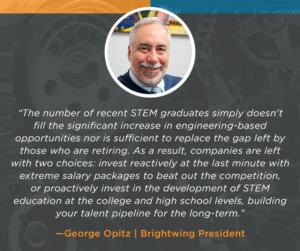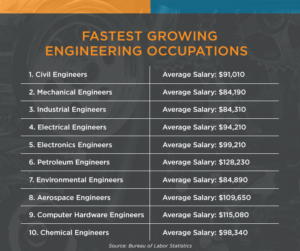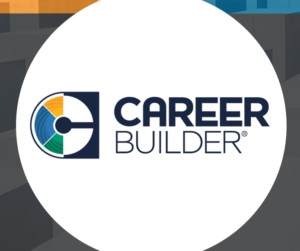Finding and attracting top-tier talent is no easy feat – so how can you hire engineers with the most efficiency?
How to Find Great Employees for Your Engineering Team
Creating an effective engineering team is all about choosing the right members. Just like any job, who you work with makes a huge difference. Engineering is a field where the engineering talent of your team can affect every aspect of your growth, output, and production. Finding the right candidates to join your engineering team takes time and effort, but it is definitely worth it to find the right person. This is why most engineering companies use experienced recruiters like Brightwing to bring the talent to them.Attracting Engineering Talent in 2022
Building a team of talent in 2022 can be difficult in some ways and easy in others. In 2021, millions of Americans quit their jobs in search of new opportunities. At this point, there is a large gap in opportunities vs. candidates, which means that the job market for hiring is competitive; however, there are a lot of good candidates to be found. Creating a solid team in 2022 is very possible as a lot of people have left their jobs even after years of working for their prior companies. Finding experienced workers and newly graduated students alike is relatively easy, but attracting them to your engineering firm may be a little easier said than done.Job Offers
Creating a unique job offer to appeal to engineering talent is essential in today’s hiring scene. What does a unique job offer look like? There are a few ways to make your offer the best one on the table:Competitive Salary
Obviously offering a competitive wage is important, but including things like bonuses and room for pay raises and growth will help you stand out among the crowd. Millennials especially tend to take a job that will promise them a career path and scheduled raises rather than a high-paying job where they can’t grow. Offer salary vs. hourly, whatever may work best for you. A competitively priced job offer isn’t just important in this market, it is absolutely essential.Benefits
Offering benefits will help your employees know that you care about their health and welfare. Most large firms are offering benefits like health insurance, dental and vision, and 401ks. Make an effort to offer a benefits package that will be interesting and worth it to your new hires. If you offer a plan that doesn’t cover the basics or has an extremely high deductible, that detracts from your offer. Employee benefits are also tax-free to employers, which can help your business in return.Perks
Fun, exciting perks don’t always have to be fancy or over-the-top. You can offer monthly competitions with modest prizes. Have casual Fridays! Have special gifts for birthdays! Find a way to bring something you enjoy into the workplace, like offering a gym membership to each employee or renting out a theater twice a year for a premiere. Sometimes something simple and enjoyable can make your job stand out over another and often turn the tide for an employee trying to decide between two firms.Show them Your Spark
Help people know that you offer a problem to be solved or a challenge to face in your field. Show your engineering team that you work on something worthwhile and interesting! Engineering is sometimes seen as boring or stagnant. When you have a project that piques the interest of your candidates, you have a great reason for them to choose you over a firm that just isn’t as interesting. If you specialize in something, tell your applicants. Show them what they would miss out on if they didn’t take your offer!Building a Team of Talent
Creating an engineering team doesn’t mean just finding one good individual and building a team around them, it has to do with recruiting members that will work together as a whole. What makes a good team player in an engineering team?Team Players are Leaders
On some engineering teams, younger or less experienced engineers may feel left out or like they can’t make comments, offer criticism, or otherwise contribute beyond expectations. When teams have rigid hierarchies, non-team leads or juniors may self-censor. You certainly don’t want that – you want a team where everyone can rise to the occasion as both formal and informal leaders. Creating a team of leaders helps people to take charge and work together.How to Find the Perfect Match
Many engineering firms have a difficult time finding the engineering talent they are looking for to fill their teams. Engineers are busy and work on many different kinds of projects, and each firm may experience something different when hiring. Using a recruitment agency for engineering hires is a great way to go about building a team of talent. A renowned recruitment agency with a long-standing engineering focus like Brightwing attracts engineering talent along with other workers in design and manufacturing. Recruiting takes significant time and effort, especially when the recruiting process is optimized to get to know each applicant’s goals, strengths, and weaknesses.Easier for Employers
Creating a team has a lot to do with knowing each member, and it’s hard to go about building a team of talent if you don’t know the talents involved. Self-assessment is notoriously inaccurate, and worse, not everyone is completely honest on their resume. If someone says they are organized and collaborative but they really aren’t, it can have a ripple effect that interferes with your projects, timelines, and budgets. Using an engineering-focused recruiting agency to build engineering teams will save time, money and energy for employers because recruiters are experts at bringing engineers’ true soft and technical skills to light.let’s talk
SEND US A MESSAGE
"*" indicates required fields
Engineering is one of the top-paying careers in the country. But what are the best paying engineering jobs? These may surprise you.
It’s a job seeker’s market.
Just a few years ago, we were experiencing a talent surplus and highly competitive market. In that environment, you as the employer had all the power. Now, that script has flipped. Candidates now have all the power. This means that you’ll be competing against all the top engineering firms for qualified engineers. If you want to attract them to your firm, you need to come at them with an enticing offer. This includes going above and beyond when it comes to:- Salary + benefits (some candidates can ask for $20K more than what they were making just a few years ago)
- Responsibilities and upward mobility
- Specific projects, particularly innovative and leading-edge work
- Additional education and training
Job seekers are looking to upskill.
Given the growing demand and lucrativeness of many specialized skills, there are a number of engineering candidates who are looking to upskill in their next role. This means that engineering firms need to ask themselves the following questions:- Will this role help candidates gain new specialized skills?
- Will this role give candidates experience on projects that are innovative and cutting edge?
- Will this role serve not only as a great job, but a great step forward for their overall career?
- Electrical engineering
- Embedded systems
- Software systems
- Hardware design
- Program management
- Technicians
- Engineering managers
Candidates want to prove themselves as leaders.
Many senior engineering leaders are aging out of the workforce. You may be seeing that happen within your organization. If so, you know first hand that this is leading not only to a skill gap, but a leadership gap. Replacing qualified engineers is one thing. But replacing leaders is a whole different ball game. While you may be able to attract experienced leaders from other organizations, they’re more difficult to convince to make a change. So you may have more success bringing on younger candidates who aspire to leadership. But how do you tell which candidates have that desire? It’s true you could ask them, but someone who says “I want to be a leader” may not be cut out for it. However, there are a number of soft skills you can look out for during the interview process:- Active listening and response to your questions
- Empathy
- Initiative (i.e. they don’t wait for you to ask questions, they’re asking questions too)
- Curiosity (again, they’re ask lots of questions)
- Positive response to constructive criticism (e.g. they ask you if you have concerns about their resume/experience)
Conclusion: Sell the experience of working at your firm.
All of these market trends boil down to one thing: you can’t just expect engineers to come flocking to you. Instead, you have to sell the experience of working at your firm. This involves collaborating with the marketing department to work on building your brand. If you’ve had bad experiences with employees in the past, some reputation management work is also in order. And if you don’t consider yourself the best person to “sell” someone on your company, then you need to find someone else in the organization who is. Overall, engineering candidates are going to need a great reason to choose you over the competitors. If you put some work into the process, offer a great package, and present them with the chance to work at a top-tier, cutting-edge firm, you’ll have some stellar candidates lining up to take the job.let’s talk
SEND US A MESSAGE
"*" indicates required fields
There’s a talent gap in the engineering sector.
There’s a growing number of job opportunities for qualified engineers, along with a shortage of qualified engineering talent. The result is a growing talent gap. Although more people are graduating from college with engineering degrees, they don’t always have the requisite skills to succeed at top engineering firms. From conversations I’m having with employers, they’re finding fewer and fewer candidates that are qualified to work on their projects and replace outgoing Boomer talent. If you have experience in the sector, this puts you in a powerful position. More opportunities plus less competition means that you basically have your pick of the jobs available. So if you’ve got a dream job or company that you want to work for, now is the time to go for it.Candidates have the power.
Just a few years ago, we were experiencing a talent surplus and highly competitive market. In that environment, the employers had all the power. Now the script has flipped completely. As the candidate, you have the power. Not only can you more easily find your way into your dream job, you also have a better chance at negotiating for better opportunities & benefits:- Salary + benefits (some candidates can ask for $20K more than what they were making just a few years ago)
- Responsibilities and upward mobility
- Specific projects
- Additional education and training
Innovation & specialization are in demand.
Making a job switch shouldn’t only be based on the short term, but the long-term impact it could have on your career. Given the demand for very specialized skill sets among engineering firms, one question you should ask when looking for a job is: Will I work on projects here that will allow me to gain new specialized skills? For example, in automotive engineering, there is a lot of talk around autonomous & electric vehicles. The autonomous vehicle sector is slated to grow 39.4% by 2026. Additionally, most of the major OEMs have set net-zero emissions goals before 2030, meaning that they are investing heavily in electric vehicle development. Some of the other skills that we are seeing increased demand for are:- Electrical engineering
- Embedded systems
- Software systems
- Hardware design
- Program management
- Technicians
- Engineering managers
Engineering firms are looking for new leadership.
As I mentioned earlier, many senior engineering leaders are aging out of the workforce. This is resulting in not only a skill gap, but also in a leadership gap. Not all engineers aspire to corporate leadership. And that’s totally fine. But if it’s something you’re at least open to, you’re probably going to be in a stronger position going in. Granted, you don’t want to walk into an interview saying “I want to be a leader.” That’s not going to get you anywhere. But you can demonstrate strong leadership skills during the interview in a much subtler way:- Active listening and response to the interviewer questions
- Empathy
- Initiative (i.e. don’t wait for the interviewer to ask questions, you ask questions too)
- Curiosity (again, ask questions)
- Positive response to constructive criticism (e.g. ask them if they have concerns about your resume/experience)
Conclusion: The market is all yours.
If you want to be in the strongest position possible as a job seeker, now is the time to get into the market. You’re going to be hard pressed to find another time when the market is placing this much power into candidates’ hands. This applies no matter where you are in the process: whether you are looking to advance to the next level, just starting out, or a tenured engineer ready for a new challenge. Reach out to Brightwing and our trusted, people-first process can help you find your ideal job match.let’s talk
SEND US A MESSAGE
"*" indicates required fields
Move fast.
In a highly competitive market, engineering candidates are fielding job offers left and right. That’s why speed is an important factor in getting a candidate to accept your offer. I know that a lot of companies want to be absolutely sure before they make an offer. After all, hiring someone is a big investment. It makes sense that you’d want to take your time. But consider this: let’s say you have engaged an ideal candidate but haven’t made an offer yet. At the same time, they’re entertaining an offer from a competitor. Which company do you think they’re going to go with? Who would you go with, if you were in their shoes? Clearly, it would be the competitor who’s already made an offer. My advice is to always assume that there’s another offer on the table. That way, you’ll move as fast as possible and won’t miss the opportunity to work with your ideal candidate.Showcase your state-of-the-art projects.
There’s a lot of demand for engineers with niche skill sets. For example, in the automotive sector, experience with autonomous vehicles or electrification is a massive plus. As a result, engineering candidates are looking for jobs where they can pick up these skills. If you have state-of-the-art projects that you’re working on, be sure to showcase that in the interview process. Technical recruiters should highlight projects that provide opportunities for engineers to learn, grow, and upskill. It gives them a compelling reason for them to accept your offer, rather than a competitor’s.Manage your market reputation.
People want to work for reputable companies. So if you have a tarnished reputation, you’re going to have a hard time attracting and landing top engineering talent. Anyone can Google your company, read reviews on sites like Glassdoor, see what people are saying about you on social media, and will certainly call anyone in their professional network who’s had experience working with you. Bottom line: you can’t get away with anything anymore. Hopefully, your reputation is so great that you won’t have to worry about this. But that’s not always under your control. Sometimes, you’ll be a part of an organization that has had a shady past and you’re trying to turn it around. If that’s the case, then reputation management has to be part of your recruitment strategy. Here are some intentional steps you can take:- Own your mistakes. Don’t try and pretend like past mistakes never happened. Your candidates are smarter than that. Instead, own up to them and show that you’re ready to make a change.
- Proactively respond to complaints. Don’t wait for the candidate to bring up the bad reviews. Show that you’re proactive by letting the candidate know that you’re taking steps to turn things around.
- Show that you’re serious about moving forward. Don’t just talk the talk: walk the walk. Provide tangible examples of new policies or benefits that will reverse the negatives of the past.
Provide upward mobility.
Top engineering talent isn’t just looking for a J.O.B. They want to work in an organization that they can contribute value to, but will also contribute value to them in their career. This includes salary, benefits, and office culture, but also upward mobility Granted, this is something they have to work for. But if you’re talking to great talent, they know they’re going to have to work for it. Odds are, they’ll work extremely hard for it. They just want to know that, at the end of the line, there’s going to be a reward for all of that hard work. No one wants to take a dead-end job. By showing that you’re a place where engineers can grow in their careers, you’re going to set yourself apart from the competition.How to “sell” the experience to top engineering talent
Having all of these benefits is great. But unless you can communicate them to the candidate, they’re not going to help you land that great talent. In a typical job interview, the onus falls on the candidate to sell themselves. But on the flip side, you need someone who can sell your organization and present all of these reasons why an engineer would want to work with you. If you aren’t a natural salesperson, then you need to find someone within the company who can provide this support. Remember: the key to finding and landing top engineering talent is to proactively sell your company to the talent market. If great engineers see that you’re an exciting place to work, you won’t have a hard time landing them.let’s talk
SEND US A MESSAGE
"*" indicates required fields
Avoid the resume trap.
In the engineering world, an “interview” will often just be two people sitting down to go over the candidate’s resume. This is a waste of everyone’s time. It’s not that resumes aren’t important. But people can read a resume at any time. There’s no need to spend valuable in-person time rehashing information the interviewer already knows. On top of that, resumes are great at answering, “what have you done & what can you do?” But if you’re going to own the interview, you need to show them, “why should I hire you?” Make your value as a candidate clear. Talk about experiences and insights that aren’t on the resume. Ask questions, tell stories, anything that engages the interviewer. By avoiding the resume trap, you can ensure that the interviewer gets a full picture of who you are and what you have to offer.Ask questions about the projects you’ll be working on.
A lot of people think that the main goal of a job interview is to impress the interviewer. And while, yes, you want to make a great first impression, there’s more to it than that. An interview is a conversation. You need to answer questions, but you also should be asking them. The more information you have, the better you’ll understand whether this is somewhere where you actually would want to work:- What kinds of projects will I be working on?
- Do your engineers tend to work collaboratively or individually?
- What is the work environment like (fast-paced & stressful, or more balanced)?
Don’t oversell your contributions to past projects.
A common trend I find among junior engineers is they spend way too much time talking about big, impressive projects where they made a minimal contribution. Experienced engineers, on the other hand, talk about the big contributions they made, even if the project was smaller in scope. The people interviewing you aren’t stupid. They’ve got years and years of experience within the field. If you start overselling yourself, they’ll know. Worse, they’ll likely use that as an opportunity to quiz you even harder. And if you can’t answer those questions, then you’re going to look a heck of a lot worse than if you had just stuck to specifics. So stay humble. Be specific. If you can demonstrate the value you provide them, that’ll impress them more than anything.Be prepared regardless of the interview format.
Although we’re moving into a post-COVID world, there are some things that will probably stay, like the rise of video interviews over Zoom or Skype. Now, ideally we’d like everyone to get an in-person interview. But it’s not something you can take for granted anymore. You have to be prepared for both. Just like with the in-person interview, the goal is to be engaging and interesting. Here are a few things to keep in mind:- Take the initiative. Show up a few minutes early, and be on camera and ready when the interviewer logs on.
- Remember where the “eyes” are. Eye contact is so important, but remember that while we’re trained to look at a person directly, you need to look at the camera in order for it to seem like you’re making eye contact.
- Actively listen. It’s hard to show that you’re engaged on a Zoom call. To combat this, make sure you’re actively listening and responding to what they say.
Conclusion: Show your leadership potential.
One of the things that I’ve noticed about the market right now is that companies aren’t just looking for engineers. They’re also looking for leaders. Not all engineers aspire to leadership. And that’s fine. But if you demonstrate that you have leadership qualities, it’s going to make you all the more attractive to the company, regardless of what your ultimate aspirations are. By taking ownership of your interview and asking questions, you can demonstrate that you are a leader in your field. Interviewers will certainly see that, respond positively to it, and, hopefully, it’ll be a no-brainer for them to hire you.let’s talk
SEND US A MESSAGE
"*" indicates required fields
The engineering and manufacturing talent shortage isn’t just a buzzword. Its impact is both global and local. Read on to dig into the shortage.
Contents
- A Quick Glance at the 2019 Labor Market
- A New Focus for the Future of Hiring
- Hiring Insights in Engineering
- 2019 from the Perspective of Key Leaders
A Glance at the 2019 Labor Market
 The national unemployment rate is at a record low since 1969 and is even lower in many industry sectors and regional markets.
The national unemployment rate is at a record low since 1969 and is even lower in many industry sectors and regional markets.
 This is a typical increase in wages, only 0.1% higher than 2018, which implies stagnant wage growth.
However, job switchers in engineering can expect a 4.9% wage increase – a highly attractive reason to seek something new.
[vc_empty_space]
This is a typical increase in wages, only 0.1% higher than 2018, which implies stagnant wage growth.
However, job switchers in engineering can expect a 4.9% wage increase – a highly attractive reason to seek something new.
[vc_empty_space]
 25.7% of employees are actively seeking new job opportunities.
And 55.5% are passively open to new job opportunities.
25.7% of employees are actively seeking new job opportunities.
And 55.5% are passively open to new job opportunities.
Best cities for jobs
 Glassdoor ranks these cities based on hiring opportunity, cost of living, and overall job satisfaction:
Glassdoor ranks these cities based on hiring opportunity, cost of living, and overall job satisfaction:
- Pittsburgh, PA
- St. Louis, MO
- Indianapolis, IN
- Cincinnati, OH
- Hartford, CT
- Boston, MA
- Memphis, TN
- Raleigh, NC
- Cleveland, OH
- Detroit, MI
Top Perks Employers are Highlighting
- Casual dress codes
- Employee discounts
- Remote work opportunities
- Extra paid time off
- Signing bonuses
- Free lunches
- Gym memberships
- Work from home Fridays
- Daycare
A New Focus for the Future of Hiring
In 2018, AI-powered recruitment technologies took off across every industry. Seeking to automate the application, screening, and interviewing processes, these tools unburden the hands and minds of recruiters and corporate talent acquisition professionals everywhere. However, our stance on this trend has been, and always will be, that humans are greater than machines – most especially in recruiting for highly skilled Technology, Finance, Engineering and Marketing professionals. Even with a quarter of employees looking for a new job, and over half passively interested should the opportunity present itself, employers cannot rely on the programming of their recruitment technology to make the right matches and entice the best-fit talent. This is the year that employers must focus on the human side of recruitment, specifically, the candidate experience. Here are a few numbers proving why the candidate experience is critical this year: 68% of employees believe the candidate experience is a reflection of the employee experience
68% of employees believe the candidate experience is a reflection of the employee experience
 51% of people continue to look for jobs even after they’ve accepted an offer
51% of people continue to look for jobs even after they’ve accepted an offer
 31% of candidates expect a customized message when a company reaches out with a new opportunity
31% of candidates expect a customized message when a company reaches out with a new opportunity
 55% of applicants give up if they haven’t heard back from a company within two weeks
In short, the role of the candidate experience in your recruitment process cannot be overlooked. One in seven new hires accept a job offer only to walk away at the last minute. Do not let this become your story.
55% of applicants give up if they haven’t heard back from a company within two weeks
In short, the role of the candidate experience in your recruitment process cannot be overlooked. One in seven new hires accept a job offer only to walk away at the last minute. Do not let this become your story.
Quick steps to an awesome candidate experience
- A fast and easy (and mobile-responsive) application process
- Quick feedback and responses to every candidate
- A compelling employer brand that reflects your company culture
- Personalized emails, phone calls, and messages throughout the process
- A short, but thorough, interview process
- A clear understanding of the benefits and perks you offer
- An efficient and valuable onboarding process
Hiring Insights in Engineering
Engineering employment has seen sustained growth over the last few years, up 2.27% in the last year alone. A majority of companies, 69%, anticipate hiring more engineers over the next 5-10 years.
The Growing Engineering Talent Shortage
The demand is strong, but the level of engineering talent can’t keep pace. This is partly due to too few engineering graduates, as well as an increasing number of retirees. It’s a major concern; 98% of companies are all too aware of how their business can suffer if they can’t fill open engineering positions. Here are the top 5 biggest concerns with the engineering shortage:- Loss of competitiveness
- Inability to innovate
- Higher product development costs
- Lost revenue opportunities
- Poor design efficiency
|
|
|
2019 from the Perspective of Key Leaders
 “Low unemployment and increasing skills gaps continue to plague employers who are struggling to fill roles at all levels within their organizations,” said Matt Ferguson, CEO of CareerBuilder. “Fifty percent of U.S. employers reported that it is taking them longer to fill jobs today compared to any other period of time — a trend that is ultimately giving job seekers more leverage.”
“Low unemployment and increasing skills gaps continue to plague employers who are struggling to fill roles at all levels within their organizations,” said Matt Ferguson, CEO of CareerBuilder. “Fifty percent of U.S. employers reported that it is taking them longer to fill jobs today compared to any other period of time — a trend that is ultimately giving job seekers more leverage.”
How Are You Overcoming the Engineering Talent Shortage?
You’re probably gearing up for 2019 hiring, but some of these statistics might be concerning. For us, these statistics are eye-opening. We’re always looking for new ways to partner with companies to overcome these challenges. Our talent acquisition solutions are one-part relationships, one-part insight, and one-part results. It’s a recipe that works every time, and we’d love to introduce you.We want to partner with you. Let’s chat.
Share This Post [social-share] More Like ThisWhile there’s a lot of excitement for those in and around the engineering industry, there are a handful of locations where demand for engineers is higher than others.
Have you heard about GM’s plan for a zero-emission future? See what they’re doing to launch 20 new all-electric and hydrogen fuel cell vehicles by 2023!
If you want to place key positions faster, you need to avoid this six common recruitment mistakes. Here’s how to do it.
Find out how Brightwing’s 5 Tips for Purpose-Driven Recruiting can help improve your internal recruiting process for identifying higher quality candidates.
The Mercedes Concept A Sedan is a key part of their campaign to show that “the time of creases is over.” See how it could revolutionize small-car design.
Grow and succeed as an engineering professional by following these 3 main steps.
Before you decide quitting your job is the best idea, consider theses five things to make sure this is the right move for you
We work with dozens of organizations, & speak to hundreds of engineering professionals every week. Our recruiters gave their top engineering career advice.
Engineers need to go beyond expertise and professional background to secure their ideal job – 3 ways you can stand out as an engineering job seeker.
Self-Driving cars are transforming the automotive industry! Checkout the companies that are involved and how they are changing the industry.
What does it take to become an indispensable engineering professional? Here are 3 ways to make your job as an engineer, indispensable|What does it take to become an indispensable engineering professional? Here are 3 ways to make your job as an engineer, indispensable|What does it take to become an indispensable engineering professional? Here are 3 ways to make your job as an engineer, indispensable
Negotiate a job offer successfully with a variety of tips and advice that’ll guide you through every step of the negotiation process.
In the thriving STEM fields, interpersonal skills are becoming increasingly important in career advancement.|In the thriving STEM fields, interpersonal skills are becoming increasingly important in career advancement.|In the thriving STEM fields, interpersonal skills are becoming increasingly important in career advancement.
Follow engineering career advice and discover career paths, opportunities, and what employment outlook looks like for future engineers.
GM and Toyota are in the connected car news again, but so is…Dominoes?


